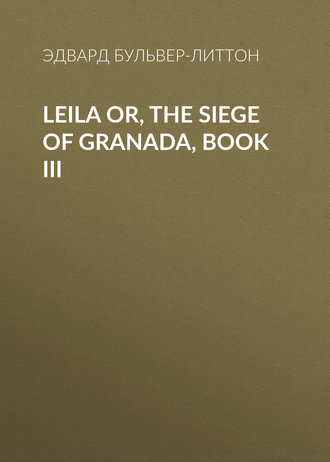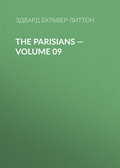
Эдвард Бульвер-Литтон
Leila or, the Siege of Granada, Book III
"Speak, and fear not."
"My father—hath aught been heard of him? He promised, that ere the fifth day were past, he would once more see his child; and, alas! that date is past, and I am still alone in the dwelling of the stranger."
"Unhappy child!" muttered Isabel to herself; "thou knowest not his treason nor his fate—yet why shouldst thou? Ignorant of what would render thee blest hereafter, continue ignorant of what would afflict thee here. Be cheered, maiden," answered the queen, aloud. "No doubt, there are reasons sufficient to forbid your meeting. But thou shalt not lack friends in the dwelling-house of the stranger."
"Ah, noble queen, pardon me, and one word more! There hath been with me, more than once, a stern old man, whose voice freezes the blood within my veins; he questions me of my father, and in the tone of a foe who would entrap from the child something to the peril of the sire. That man—thou knowest him, gracious queen—he cannot have the power to harm my father?"
"Peace, maiden! the man thou speakest of is the priest of God, and the innocent have nothing to dread from his reverend zeal. For thyself, I say again, be cheered; in the home to which I consign thee thou wilt see him no more. Take comfort, poor child—weep not: all have their cares; our duty is to bear in this life, reserving hope only for the next."
The queen, destined herself to those domestic afflictions which pomp cannot soothe, nor power allay, spoke with a prophetic sadness which yet more touched a heart that her kindness of look and tone had already softened; and, in the impulse of a nature never tutored in the rigid ceremonials of that stately court, Leila suddenly came forward, and falling on one knee, seized the hand of her protectress, and kissed it warmly through her tears.
"Are you, too, unhappy?" she said. "I will pray for you to my God!"
The queen, surprised and moved at an action which, had witnesses been present, would only perhaps (for such is human nature) have offended her Castilian prejudices, left her hand in Leila's grateful clasp; and laying the other upon the parted and luxuriant ringlets of the kneeling maiden, said, gently,—"And thy prayers shall avail thee and me when thy God and mine are the same. Bless thee, maiden! I am a mother; thou art motherless—bless thee!"
CHAPTER II
THE TEMPTATION OF THE JEWESS,—IN WHICH THE HISTORY PASSES FROM THE OUTWARD TO THE INTERNAL
It was about the very hour, almost the very moment, in which Almamen effected his mysterious escape from the tent of the Inquisition, that the train accompanying the litter which bore Leila, and which was composed of some chosen soldiers of Isabel's own body-guard, after traversing the camp, winding along that part of the mountainous defile which was in the possession of the Spaniards, and ascending a high and steep acclivity, halted before the gates of a strongly fortified castle renowned in the chronicles of that memorable war. The hoarse challenge of the sentry, the grating of jealous bars, the clanks of hoofs upon the rough pavement of the courts, and the streaming glare of torches—falling upon stern and bearded visages, and imparting a ruddier glow to the moonlit buttresses and battlements of the fortress—aroused Leila from a kind of torpor rather than sleep, in which the fatigue and excitement of the day had steeped her senses. An old seneschal conducted her, through vast and gloomy halls (how unlike the brilliant chambers and fantastic arcades of her Moorish home) to a huge Gothic apartment, hung with the arras of Flemish looms. In a few moments, maidens, hastily aroused from slumber, grouped around her with a respect which would certainly not have been accorded had her birth and creed been known. They gazed with surprise at her extraordinary beauty and foreign garb, and evidently considered the new guest a welcome addition to the scanty society of the castle. Under any other circumstances, the strangeness of all she saw, and the frowning gloom of the chamber to which she was consigned, would have damped the spirits of one whose destiny had so suddenly passed from the deepest quiet into the sternest excitement. But any change was a relief to the roar of the camp, the addresses of the prince, and the ominous voice and countenance of Torquemada; and Leila looked around her, with the feeling that the queen's promise was fulfilled, and that she was already amidst the blessings of shelter and repose. It was long, however, before sleep revisited her eyelids, and when she woke the noonday sun streamed broadly through the lattice. By the bedside sat a matron advanced in years, but of a mild and prepossessing countenance, which only borrowed a yet more attractive charm from an expression of placid and habitual melancholy. She was robed in black; but the rich pearls that were interwoven in the sleeves and stomacher, the jewelled cross that was appended from a chain of massive gold, and, still more, a certain air of dignity and command,– bespoke, even to the inexperienced eye of Leila, the evidence of superior station.
"Thou hast slept late, daughter," said the lady, with a benevolent smile; "may thy slumbers have refreshed thee! Accept my regrets that I knew not till this morning of thine arrival, or I should have been the first to welcome the charge of my royal mistress."
There was in the look, much more than in the words of the Donna Inez de Quexada, a soothing and tender interest that was as balm to the heart of Leila; in truth, she had been made the guest of, perhaps, the only lady in Spain, of pure and Christian blood, who did not despise or execrate the name of Leila's tribe. Donna Inez had herself contracted to a Jew a debt of gratitude which she had sought to return to the whole race. Many years before the time in which our tale is cast, her husband and herself had been sojourning at Naples, then closely connected with the politics of Spain, upon an important state mission. They had then an only son, a youth of a wild and desultory character, whom the spirit of adventure allured to the East. In one of those sultry lands the young Quexada was saved from the hands of robbers by the caravanserai of a wealthy traveller. With this stranger he contracted that intimacy which wandering and romantic men often conceive for each other, without any other sympathy than that of the same pursuits. Subsequently, he discovered that his companion was of the Jewish faith; and, with the usual prejudice of his birth and time, recoiled from the friendship he had solicited, and shrank from the sense of the obligation he had incurred he—quitted his companion. Wearied, at length, with travel, he was journeying homeward, when he was seized with a sudden and virulent fever, mistaken for plague: all fled from the contagion of the supposed pestilence—he was left to die. One man discovered his condition— watched, tended, and, skilled in the deeper secrets of the healing art, restored him to life and health: it was the same Jew who had preserved him from the robbers. At this second and more inestimable obligation the prejudices of the Spaniard vanished: he formed a deep and grateful attachment for his preserver; they lived together for some time, and the Israelite finally accompanied the young Quexada to Naples. Inez retained a lively sense of the service rendered to her only son, and the impression had been increased not only by the appearance of the Israelite, which, dignified and stately, bore no likeness to the cringing servility of his brethren, but also by the singular beauty and gentle deportment of his then newly-wed bride, whom he had wooed and won in that holy land, sacred equally to the faith of Christian and of Jew. The young Quexada did not long survive his return: his constitution was broken by long travel, and the debility that followed his fierce disease. On his deathbed he had besought the mother whom he left childless, and whose Catholic prejudices were less stubborn than those of his sire, never to forget the services a Jew had conferred upon him; to make the sole recompense in her power—the sole recompense the Jew himself had demanded—and to lose no occasion to soothe or mitigate the miseries to which the bigotry of the time often exposed the oppressed race of his deliverer. Donna Inez had faithfully kept the promise she gave to the last scion of her house; and, through the power and reputation of her husband and her own connections, and still more through an early friendship with the queen, she had, on her return to Spain, been enabled to ward off many a persecution, and many a charge on false pretences, to which the wealth of some son of Israel made the cause, while his faith made the pretext. Yet, with all the natural feelings of a rigid Catholic, she had earnestly sought to render the favor she had thus obtained amongst the Jews minister to her pious zeal for their more than temporal welfare. She had endeavored, by gentle means, to make the conversions which force was impotent to effect; and, in some instances, her success had been signal. The good senora had thus obtained high renown for sanctity; and Isabel thought rightly that she could not select a protectress for Leila who would more kindly shelter her youth, or more strenuously labor for her salvation. It was, indeed, a dangerous situation for the adherence of the maiden to that faith which it had cost her fiery father so many sacrifices to preserve and to advance.






